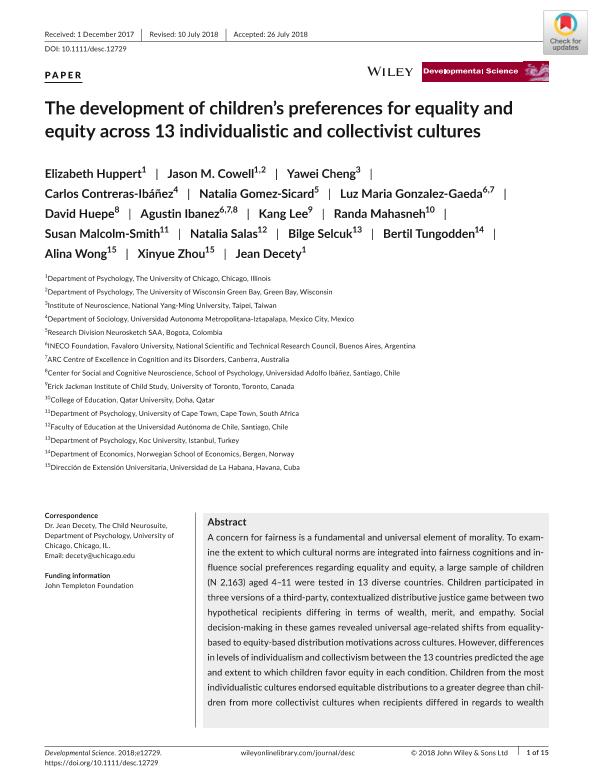Artículo
The development of children's preferences for equality and equity across 13 individualistic and collectivist cultures
Huppert, Elizabeth; Cowell, Jason M.; Cheng, Yawei; Contreras Ibáñez, Carlos César; Gomez Sicard, Natalia; González Gadea, María Luz ; Huepe, David; Ibañez, Agustin Mariano
; Huepe, David; Ibañez, Agustin Mariano ; Lee, Kang; Mahasneh, Randa; Malcolm Smith, Susan; Salas, Natalia Anahí; Selcuk, Bilge; Tungodden, Bertil; Wong Carriera, Alina; Zhou, Xinyue; Decety, Jean
; Lee, Kang; Mahasneh, Randa; Malcolm Smith, Susan; Salas, Natalia Anahí; Selcuk, Bilge; Tungodden, Bertil; Wong Carriera, Alina; Zhou, Xinyue; Decety, Jean
 ; Huepe, David; Ibañez, Agustin Mariano
; Huepe, David; Ibañez, Agustin Mariano ; Lee, Kang; Mahasneh, Randa; Malcolm Smith, Susan; Salas, Natalia Anahí; Selcuk, Bilge; Tungodden, Bertil; Wong Carriera, Alina; Zhou, Xinyue; Decety, Jean
; Lee, Kang; Mahasneh, Randa; Malcolm Smith, Susan; Salas, Natalia Anahí; Selcuk, Bilge; Tungodden, Bertil; Wong Carriera, Alina; Zhou, Xinyue; Decety, Jean
Fecha de publicación:
09/2018
Editorial:
Blackwell Publishing
Revista:
Developmental Science
ISSN:
1363-755X
e-ISSN:
1467-7687
Idioma:
Inglés
Tipo de recurso:
Artículo publicado
Clasificación temática:
Resumen
A concern for fairness is a fundamental and universal element of morality. To examine the extent to which cultural norms are integrated into fairness cognitions and influence social preferences regarding equality and equity, a large sample of children (N 2,163) aged 4–11 were tested in 13 diverse countries. Children participated in three versions of a third-party, contextualized distributive justice game between two hypothetical recipients differing in terms of wealth, merit, and empathy. Social decision-making in these games revealed universal age-related shifts from equality-based to equity-based distribution motivations across cultures. However, differences in levels of individualism and collectivism between the 13 countries predicted the age and extent to which children favor equity in each condition. Children from the most individualistic cultures endorsed equitable distributions to a greater degree than children from more collectivist cultures when recipients differed in regards to wealth and merit. However, in an empathy context where recipients differed in injury, children from the most collectivist cultures exhibited greater preferences to distribute resource equitably compared to children from more individualistic cultures. Children from the more individualistic cultures also favored equitable distributions at an earlier age than children from more collectivist cultures overall. These results demonstrate aspects of both cross-cultural similarity and divergence in the development of fairness preferences.
Archivos asociados
Licencia
Identificadores
Colecciones
Articulos(INCYT)
Articulos de INSTITUTO DE NEUROCIENCIAS COGNITIVAS Y TRASLACIONAL
Articulos de INSTITUTO DE NEUROCIENCIAS COGNITIVAS Y TRASLACIONAL
Citación
Huppert, Elizabeth; Cowell, Jason M.; Cheng, Yawei; Contreras Ibáñez, Carlos César; Gomez Sicard, Natalia; et al.; The development of children's preferences for equality and equity across 13 individualistic and collectivist cultures; Blackwell Publishing; Developmental Science; 22; 2; 9-2018; 1-15
Compartir
Altmétricas



